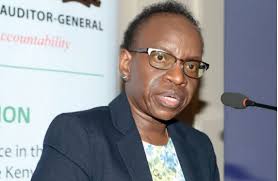
MPs have mounted pressure on Kenya Power to recover Sh274
million that was paid to a consultant who was supervising the last-mile
connectivity project.
This followed a query by Auditor General Nancy Gathungu that
there was no evidence the consultant hired during the Uhuru Kenyatta era delivered the assignment to warrant the payment.
In a report for the year to June 30, 2021, the auditor
reported that site visits by auditors revealed no evidence of the consultant’s
presence at the sites.
“There was no evidence of the consultant’s personnel’s
presence at those sites, raising doubt on whether they had been deployed as per
the contract,” the audit read.
The auditor general’s report revealed missing
documentation, including attendance records and minutes to verify the
consultants’ participation.
Committee chairman David Pkosing (Pokot South MP) took
a firm stance, demanding that Kenya Power provide a detailed list of the
consultants hired and proof of their engagement.
During a committee sitting yesterday, the MP asked the power
utility to furnish the panel with site visit logs or inspection reports for it
to resolve the audit query.
He dismissed the possibility that all consultants were
absent, stating, "It cannot be that they were all unavailable. We are
talking about Sh274 million paid to people who may not have done the
work."
“I am not convinced that they can all be away,” Pkosing said
during a review of KPLC audit queries for various financial years.
He directed that KPLC produce the required details or those
concerned be surcharged for the flagged possible loss.
Kenya Power managing director Joseph Siror defended
the payments, explaining that supervision was milestone-based rather
than continuous.
He explained that the milestone-based payments meant that
the consultants were only required to verify completed phases of the project.
“The consultant supervises multiple sites per lot, which cuts
across several counties,” Siror told the oversight committee.
“The audit team was assigned to the KPLC engineers for the period
of the audit, whereas the consultant was engaged in supervising ongoing sites at
the same time.”
However, auditors countered that even milestone checks
lacked proper documentation, raising concerns over whether the consultants
fulfilled their contractual obligations.
“The available minutes tell whether the consultant personnel
were present at those sites. Minutes help us get the details,” an officer of the
OAG said.
Kenya Power fought back, saying, “The consultant was one firm
that was to deploy the monitors. All inspections are done by the joint team, and
no job is paid for without the team.”
The committee has now directed Kenya Power to recover
the funds if investigations confirm the consultants hired in November 2017 were not on-site.
The audit also raised concerns about missing documents that
are key to the procurement of works and services.
Among those cited include feasibility studies and surveys,
progress reports for projects, technical specifications, and bills of
quantities.
Kenya Power managers told the committee that the firm would strive to clear the audit questions, exuding confidence that they were on track to reduce the cost of power further.
INSTANT ANALYSIS
The case highlights broader governance lapses at the utility
firm, including weak oversight in procurement and poor
record-keeping, which have previously led to financial losses and
inefficiencies. As the probe continues, the committee insists on transparency
and accountability, emphasising that public funds must be protected from
misuse. The outcome could set a precedent for stricter enforcement of
contractor supervision in future projects.

















